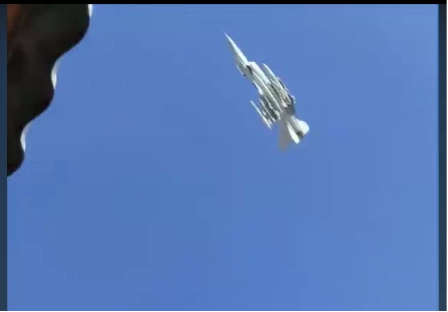RIA Novosti, a Russian state-owned news agency, said that mini-drones that could perform attack, reconnaissance and electronic warfare (EW) missions had been developed for its Su-57 stealth fighters, citing an anonymous source.
According to the report, Su-57s would carry and deploy unmanned aerial vehicles (UAVs) using external weapon slots or internal weapons bays, like conventional armaments.
JOIN US ON TELEGRAM
Follow our coverage of the war on the @Kyivpost_official.
“Mini-UAVs for various purposes have been created for the Su-57, which the aircraft can carry on an external [mounting station] and in the [internal weapons bay] fuselage compartment and be dropped in the air. It is planned that the fighter will launch several drones at once and control this group of drones,” said the source.
However, it is not known if Russia had converted its existing drone arsenals for the project or if they developed a new drone model if the claims were indeed valid.
So far there have been no confirmations of the development to substantiate the claims.
The report also corresponded to a new patent submitted by Russia’s United Aircraft Corporation (UAC) recently for a two-seat version of the Su-57 fighters, where drone-control capabilities were mentioned in the document without specifying how they would achieve that.
The RIA Novosti report claimed that the new drone development would “allow fighters to break through enemy air defenses” by overloading the detection system.

Ukrainian Special Ops Team Storms Industrial Site, Takes Out All Russian Troops
However, this would necessitate the Su-57s to fly into enemy airspace, exposing them to air defenses – a move Russia has been reluctant to do based on the scarcity of their Su-57 fighters, where only 10-11 have been made so far with no confirmed sightings over Ukraine.
While the Kremlin is expecting to receive 76 Su-57 units by 2027, the high cost and troubled development exacerbated by Western sanctions lend serious doubts to the feasibility, as the modern avionics and components still require Western parts.
Analysts also doubted the stealth capabilities of the Su-57, claiming that the radar cross-section (RCS) – stealth measurement – of the aircraft is worse than the US current fourth-generation F/A-18 Super Hornets.
Assuming the drones would be deployed from the safety of Russian airspace, then perhaps it would just be a fancier – and costlier – method to deploy the drones without any significant advantages.
The US has been pursuing similar projects for its F-35 Lightning II, with Lockheed Martin, a major US arms manufacturer, investing $100 million into “Project Carrera,” a program that supports the infrastructure development for drone communication using human-piloted fighter jets, artificial intelligence, battlefield networked sensor arrays and low-earth-orbit satellites.
You can also highlight the text and press Ctrl + Enter











